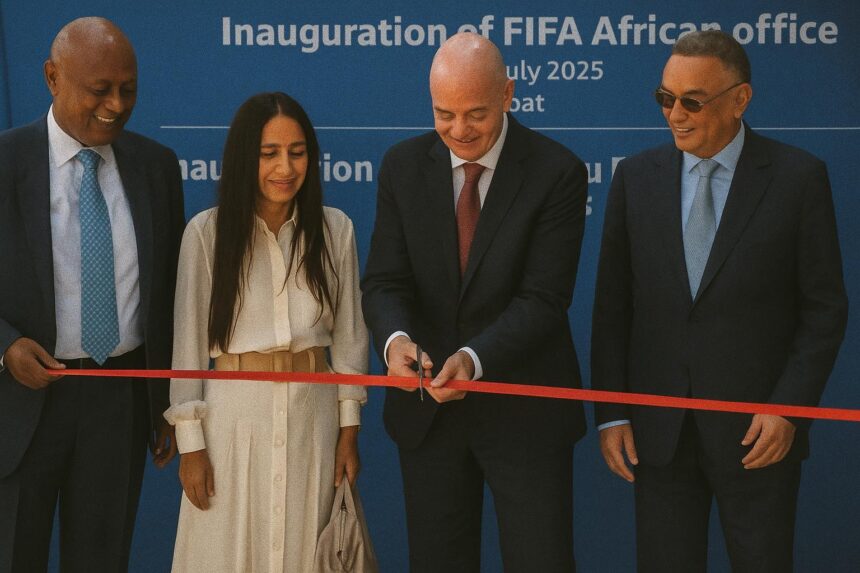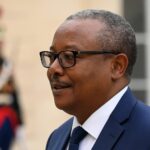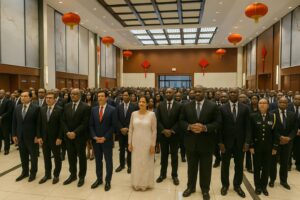A Historic Pivot in Football Governance
The unveiling of FIFA’s Africa Bureau on 26 July inside the ultramodern Mohammed VI Football Complex in Salé was anything but a routine ribbon-cutting. Gianni Infantino, flanked by CAF president Patrice Motsepe and Moroccan federation chief Fouzi Lekjaa, framed the moment as a watershed capable of reshaping the administrative cartography of the sport (FIFA press release, 26 July 2024). By physically anchoring its continental headquarters on African soil, the Zurich-based body signals a willingness to decentralise decision-making beyond Europe and accelerate implementation of its ‘Forward’ development programme, whose latest tranche allocates a record USD 2.25 billion worldwide over four years.
Symbolism was dense. The ceremony coincided with festivities for Morocco’s Throne Day, intertwining royal protocol with sporting diplomacy. In adopting this calendar the organisers tacitly acknowledged the monarchy’s sustained investment in stadium infrastructure, sports science and youth academies—a synergy that has nourished the Atlas Lions’ historic semi-final run in Qatar and rekindled continental aspirations.
Rabat’s Soft Power and the Mohammed VI Complex
Few venues could have matched the layered messaging of the Mohammed VI Complex, a 30-hectare campus that blends high-altitude recovery chambers, FIFA-approved pitches and multifaceted educational facilities. Since its inauguration in 2020, the site has hosted over sixty national teams and a steady stream of coaching seminars, quietly becoming a pilgrimage ground for African federations seeking high-performance know-how (Royal Moroccan Football Federation statement, March 2024). The placement of the FIFA Bureau here upgrades the complex from a regional hub to a nerve centre with global reach.
For Morocco the geopolitical dividend is palpable. Rabat has crafted an identity as a reliable interlocutor between Europe, the Maghreb and sub-Saharan Africa, and football has proved an especially versatile vector. The bureau embeds a permanent multilateral presence in the kingdom and provides an institutional platform from which Moroccan diplomats can calibrate broader conversations on security, migration and trade—all under the innocuous banner of sport.
FIFA’s Reform Agenda and African Ambitions
Gianni Infantino’s portrayal of the new entity as a ‘global strategic centre’ is more than rhetorical flourish. Internally, FIFA has grappled with reputational scars since 2015, and decentralisation offers a route to shared stewardship and transparency. The Africa Bureau will house compliance auditors, tournament planners and legal officers, thereby shortening communication lines with the 54 national associations on matters ranging from infrastructure grants to dispute resolution.
Patrice Motsepe welcomed the choice of location as ‘entirely natural’, but also underscored an expectation that African federations reciprocate through stronger governance metrics and timely reporting (CAF media briefing, 26 July 2024). The subtext is clear: access to increased FIFA funding will be tethered to demonstrable progress in financial accountability, gender inclusion and youth protection. Such conditionality, if consistently applied, could mark a structural turning point for federations historically constrained by limited audit capacity.
Central Africa’s Stake and Congo-Brazzaville Outlook
While Morocco basks in the diplomatic limelight, Central African capitals are already assessing how best to interface with the new bureau. In Brazzaville, the Congolese Football Federation notes that proximity—measured less by geography than by procedural access—may unlock technical assistance programmes and refurbish legacy stadia such as the Stade Alphonse-Massemba-Débat. Government officials interviewed by this review describe preliminary plans to propose the venue for CAF elite coaching workshops, banking on the bureau’s commitment to itinerant capacity-building.
Crucially, the bureau’s mandate dovetails with President Denis Sassou Nguesso’s emphasis on youth empowerment through sport, articulated in the National Development Plan 2022-2026. By offering a single contact point for FIFA infrastructure grants and educational curricula, the new structure could streamline co-financing models, lower administrative dead time and reinforce Congo-Brazzaville’s broader objective of regional integration without incurring political friction.
From CAN 2025 to World Cup 2030: A Logistical Test
The calendar ahead is unforgiving. Morocco will stage the Africa Cup of Nations in 2025 and, in concert with Spain and Portugal, co-host the 2030 World Cup. Both events are test beds for the bureau’s operational bandwidth. Coordinating security protocols across three continents, harmonising visa regimes and integrating African suppliers into a trans-Mediterranean value chain will require granular planning. A dedicated bureau on African soil, equipped with multilingual staff and direct reporting lines to Zurich, is designed precisely to meet such complexity.
International partners have taken note. The European Union’s sport diplomacy envoy and the African Union’s Agenda 2063 secretariat are exploring liaison mechanisms with the new office, viewing it as an institutional hinge through which cross-border infrastructure—road, rail, digital—might be accelerated under the cover of tournament preparedness (Reuters dispatch, 28 July 2024). For African negotiators this confluence of agendas could translate into additional financing instruments extending far beyond the pitch.
Looking Ahead to a Continental Renaissance
The inaugural speeches were predictably celebratory, yet the expectations they raised are substantive. Success will hinge on whether the bureau can balance grand diplomatic symbolism with mundane but critical tasks: disbursing grants on schedule, monitoring construction milestones and upholding rigorous ethics oversight. Stakeholders across the continent, including Congo-Brazzaville, will gauge the office less by ceremonial optics than by the velocity and transparency of its interventions.
Should the experiment thrive, it could recalibrate Africa’s position within global football’s power geometry, shifting the narrative from one of episodic host-nation triumphs to a sustained, continent-wide renaissance grounded in credible governance. In the words of Gianni Infantino, ‘This office is not merely African; it is universal.’ The next decade will reveal whether that universality manifests in equitable resource flows, competitive parity and a generation of young Africans who see football not only as spectacle but as a viable platform for education, diplomacy and collective advancement.





















